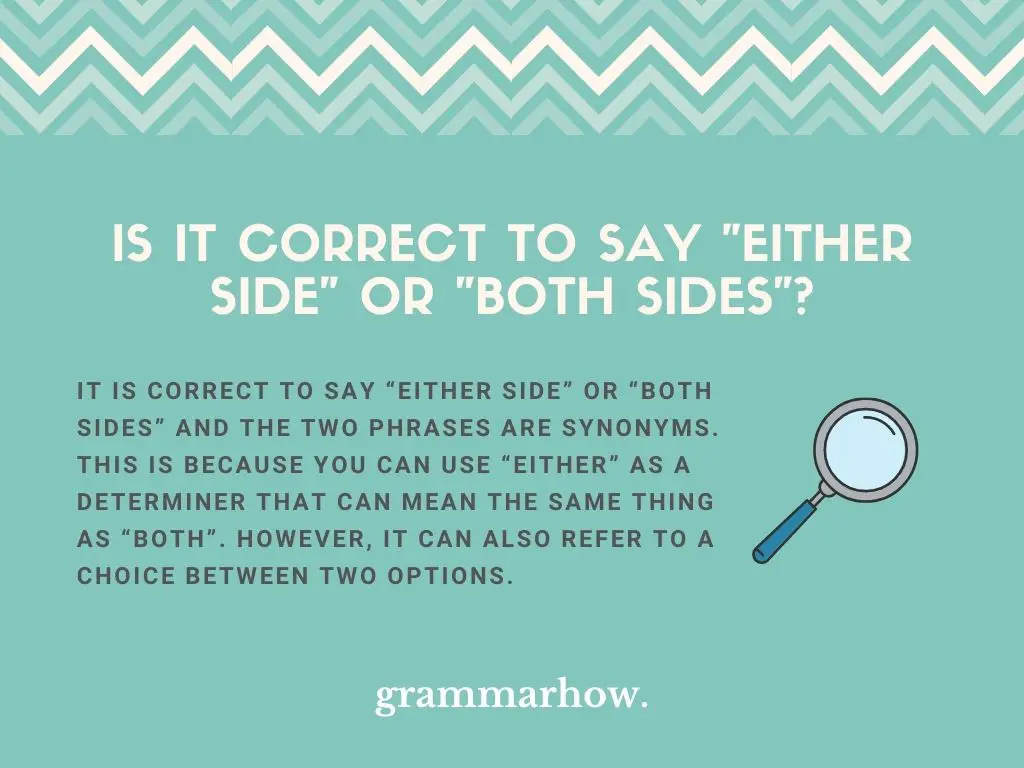English learners are often confused by the term “either side” being used to mean “both sides”. After all, isn’t “either” used to mean one or the other?
Worry not! We’ll unpack all the nuances of these phrases and give examples of when it’s appropriate to use each.
Is It Correct to Say “Either Side” or “Both Sides”?
It is correct to say “either side” or “both sides” and the two phrases are synonyms. This is because you can use “either” as a determiner that can mean the same thing as “both”. However, it can also refer to a choice between two options.

KEY TAKEAWAYS
- You can use “either side” and “both sides” interchangeably.
- This is because “either” is a synonym for “both” as well as being a word that distinguishes options.
- You can use “both” in place of “either” to denote a choice between things.
The Macmillan Dictionary defines “on either side” as “on one side of something and on the other side of it”.
Therefore, it’s correct to say:
- There were security cameras on both sides of the building.
- There were security cameras on either side of the building.
Both (or either) of these sentences have precisely the same meaning, which is that the security cameras are surrounding the building. We are not using “either”, in this case, to separate two options. Thus, it doesn’t indicate that the cameras are only on one side – it’s not an “either this or that” scenario.
Let’s take a look at another example:
- You can walk on either side of the road.
- You can walk on both sides of the road.
Here, the use of “both” doesn’t indicate that you have obscenely long legs and are able to walk with one foot on one side of the road and the other on the other. Instead, it just indicates that you have the option to walk on “either” side of the road – it’s up to you!
Either Side
It might be confusing that “either side” actually means the same thing as “both sides”. You often use “either” to show a separation between two things and “both” to bring them together, like in these examples:
- You can eat either the doughnut or the muffin.
- You can eat both the doughnut and the muffin!
However, this is only one definition of the word “either”. You can also use it as a synonym for “both”. This is the version of it that we’re seeing in the phrase “either side”. Let’s look at another example:
- I can see the scenario from either side’s point of view.
- I can see the scenario from both side’s point of view.
Both Sides
While “both” is often a word that brings together two different things, it doesn’t always suggest a sense of unity between them. In the right context, you can use it in the same way as “either”, to indicate a choice between options:
- You can choose to play for either side.
- Who do you want to play for? Both sides have spots up for grabs.
Of course, this isn’t always the case. You can use “both sides” to mean that something applies to each side being discussed:
- There are people I don’t like sitting on both sides of me at this wedding.
- There are people I don’t like sitting on either side of me at this wedding.
Either (or both) of these sentences have the same meaning – that of being surrounded by enemies.
Conclusion
You can use “either side” and “both sides” interchangeably in a sentence. Additionally, you can use these phrases when something applies to two different sides, e.g., when something is happening on both or either side of you. The phrases can also indicate a choice between two sides.

Martin holds a Master’s degree in Finance and International Business. He has six years of experience in professional communication with clients, executives, and colleagues. Furthermore, he has teaching experience from Aarhus University. Martin has been featured as an expert in communication and teaching on Forbes and Shopify. Read more about Martin here.
